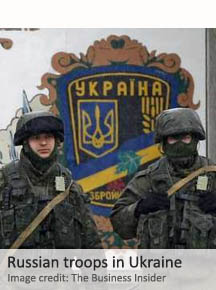Analysis: Crimea crisis brings Russian military spies back in the game
July 9, 2014 Leave a comment
 By IAN ALLEN | intelNews.org
By IAN ALLEN | intelNews.org
The recent crisis in Ukraine, which resulted in Russia assuming control of Crimean Peninsula, marks the post-Soviet resurgence of Russia’s military intelligence apparatus and points to “a new playbook” in Moscow’s foreign policy strategy, according to a seasoned Russia analyst. In an article published on Monday in Foreign Policy, Mark Galeotti, Professor of Global Affairs at New York University, who specializes in Russian security affairs, said Russia’s military intelligence agency is now “back in the global spook game”. He was referring to Russia’s Main Intelligence Directorate of the General Staff, known commonly as GRU, which he said the Kremlin will be employing increasingly in the years to come as a major foreign-policy tool. It is no secret that, despite its significant role in Cold War intelligence operations, the GRU has been in decline in the post-Soviet era. Its substandard performance in the 2008 Russo-Georgian War convinced Russian President Vladimir Putin that the agency was “unfit” for operations in what Russians call the “near-abroad” —the regions of the former Soviet Republics. In 2003, in addition to facing what Galeotti calls “a savage round of [budget] cuts”, the GRU saw its near-abroad functions taken over by the FSB, Russia’s Federal Security Service. The FSB descends from the domestic component of the Soviet-era KGB, the agency that employed Vladimir Putin before he entered politics (as an aside, the SVR, which is the post-Soviet reincarnation of the KGB’s external intelligence directorates, is legally prevented from operating within the Commonwealth of Independent States). As late as last year there was even a discussion about whether the GRU should be demoted from a main directorate under the Russian Armed Forces’ General Staff to a simple directorate, a move that would have fatally diminished its institutional stature. But in the recent Crimea crisis, says Galeotti, the GRU was able to turn the tables on Kiev by deploying its battle-ready Vostok Battalion, whose members cut their teeth in Chechnya. The Battalion’s ‘easterners’, as they are called, displayed a new “concentration on violence over subtlety” and a “swashbuckling style”, which turned them into Moscow’s primary assets on the ground. By smuggling a few key people and large numbers of weapons across the border, the GRU managed to “rip [Ukraine] apart”, says Galeotti. Moreover, he argues that the GRU’s success in Crimea points to the manner in which the Kremlin “expects to fight its future wars”, namely with a non-linear mix of “stealth, deniability, subversion, and surgical violence”. This, in turn, means that the GRU and its activities are likely to rapidly expand, and “to regain some of their old aggression”, according to Galeotti.






